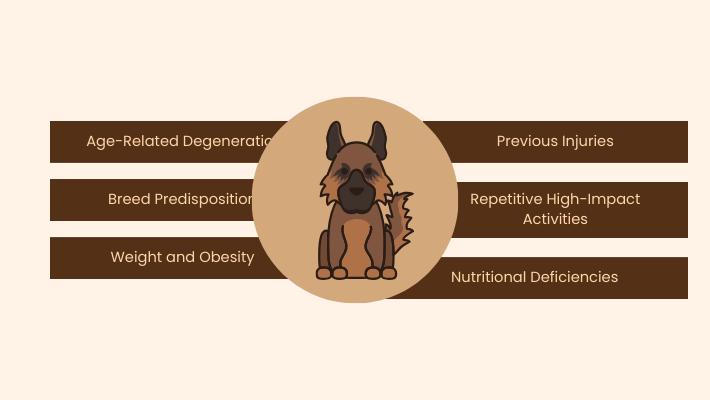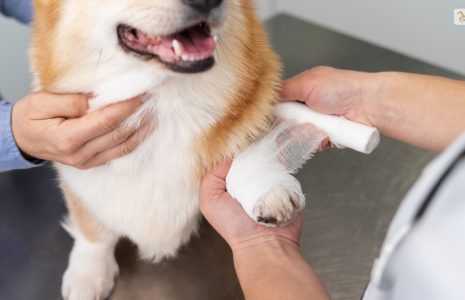Managing German Shepherd Arthritis: A Complete Care Guide


German Shepherds, with their affectionate, loyal, and affectionate nature, do a lot to improve our quality of life. However, as they age, they also face certain health challenges that can impact their quality of life. German Shepherd Arthritis is one such common issue that causes pain and stiffness in the joints, hindering their movement and zest for life.
But worry not, fellow German Shepherd parents. We are here to help. In this article, we will delve into the causes and symptoms of arthritis in German Shepherds, explore various treatment options, and provide practical tips for creating a supportive home environment. With the right approach, you can help your German Shepherd maintain an active and fulfilling life despite arthritis.
What Is Arthritis In Dogs?
Arthritis in dogs, most commonly osteoarthritis (OA), is a degenerative disease that affects the joints. It occurs when the cartilage, the smooth, cushioning material between bones, breaks down. This breakdown causes the bones to rub together, leading to inflammation, pain, and stiffness in the joints.
It is a common condition that affects German Shepherds, causing pain and discomfort in their joints. It is crucial for dog owners to understand this condition to provide the best care and support for their beloved companions.

As we have already mentioned before, arthritis in German Shepherds or in any other dogs occurs when the cartilage in the joints begins to deteriorate, leading to inflammation and stiffness. This can make it challenging for your German Shepherd to move around and perform daily activities. Here is a closer look at what happens in arthritic joints:
- Cartilage Breakdown: Healthy cartilage acts as a shock absorber and allows for smooth joint movement. In arthritis, this cartilage thins and wears away, losing its lubricating properties.
- Inflammation: The exposed bone surfaces irritate the joint lining, triggering inflammation. This inflammation causes pain and swelling.
- Stiffness: The combination of cartilage loss and inflammation restricts movement, making the joint feel stiff.
It is important to note that Arthritis can affect any joint in a dog’s body but commonly targets the hips, knees, elbows, spine, and shoulders.
Symptoms And Signs Of Arthritis In German Shepherds
Recognizing the symptoms and signs of arthritis in German Shepherds is vital for early intervention and effective management. Here is what you should watch out for:

- Changes in Gait or Favoring: A wobbly walk, limping, or preferring to use one leg over another could indicate pain in a specific joint.
- Mobility Challenges: Stiffness or difficulty getting up from rest, whining when transitioning between positions, or struggling to climb stairs are all signs of joint pain.
- Hesitation with Jumping: Your pup is hesitating or completely avoiding activities that involve reluctance to go up or downstairs, jumping up and down on furniture, or getting into the car due to discomfort.
- Reduced Activity Level: Your once energetic Shepherd might become less interested in playing fetch or going for long walks due to fatigue or pain.
- Behavioral Changes: Frustration from limitations can lead to irritability or grumpiness. In some cases, pain might cause them to become withdrawn or less social.
- Licking or Chewing at Joints: If a particular joint is causing them pain, they might lick or chew at the area excessively.
You may also notice swelling or heat around the affected joints. If you observe any of these symptoms, it is essential to consult a veterinarian for a proper diagnosis.
Causes And Risk Factors Of Arthritis In German Shepherds
German Shepherds are energetic and affectionate companions who are willing to accompany you on any activity that involves hiking, running, walking, and exploring their surroundings. But it is precisely their active lifestyles, along with genetics, that put them at higher risk for developing arthritis. Here’s a breakdown of the key causes and risk factors to be aware of:

1. Age-Related Degeneration: As with humans, German Shepherds experience wear and tear on their joints over time. This natural breakdown of cartilage is a primary cause of arthritis in older dogs.
2. Breed Predisposition: Certain breeds, including German Shepherds, are genetically predisposed to conditions like hip dysplasia and elbow dysplasia. These developmental abnormalities cause improper joint formation, leading to increased friction and early cartilage degeneration.
3. Weight and Obesity: Excess weight puts significant strain on all joints, including those in German Shepherds. Carrying extra pounds accelerates cartilage breakdown and worsens arthritic symptoms.
4. Previous Injuries: Injuries like fractures, ligament tears, or joint infections can damage cartilage and increase the risk of future arthritis in the affected joint.
5. Repetitive High-Impact Activities: While exercise is crucial for German Shepherds, activities like jumping, agility training, or overly strenuous walks on hard surfaces can stress the joints, especially in younger dogs.
6. Nutritional Deficiencies: A diet lacking essential nutrients like glucosamine and chondroitin, which are important for cartilage health, can contribute to arthritis development.
Diagnosing Arthritis In German Shepherds
If you suspect that your German Shepherd has arthritis, it is crucial to consult a veterinarian for a proper diagnosis. Here is what you can expect to happen during the diagnostic process:

Detailed Medical History
The vet will discuss your dog’s age, breed, activity level, and any past injuries or illnesses. This information helps them understand potential risk factors.
Physical Examination
The vet will thoroughly examine your dog, focusing on their joints. They’ll look for swelling, tenderness, and limitations in range of motion. They may also manipulate the joints to assess for pain responses.
Diagnostic Imaging
Along with a physical examination, the veterinarian may order additional tests, such as X-rays or joint fluid analysis, to confirm the diagnosis. These tests can help determine the severity of the arthritis and identify any underlying causes. They also help in ruling out other conditions that mimic arthritis, such as infections or immune-mediated diseases.
X-rays are the most common imaging technique used to diagnose arthritis. X-rays can reveal changes in bone structure, joint narrowing, and the presence of bone spurs, all signs of arthritis. In some cases, your veterinarian might recommend additional imaging like CT scans or MRIs for a more detailed view of the joint.
Once your German Shepherd is diagnosed with arthritis, you can work with your veterinarian to develop a suitable treatment plan.
Treatment Options For Arthritis In German Shepherds
Arthritis might be a chronic condition, but there’s no reason your German Shepherd can’t live a happy and comfortable life. Here’s an overview of the various treatment options available:

Nonsteroidal Anti-Inflammatory Drugs (NSAIDs)
These medications are the mainstay of pain management for arthritis. They help reduce inflammation and pain, allowing your dog to move more comfortably. However, NSAIDs can have side effects, so your veterinarian will carefully assess your dog’s health before prescribing them and monitor them closely during treatment.
In some cases, your veterinarian might prescribe alternative pain medications, such as opioids, for short-term pain relief or for dogs who cannot tolerate NSAIDs.Other medications, such as corticosteroids and joint supplements, may also be recommended. It is essential to follow your veterinarian’s instructions carefully when administering medication to your German Shepherd and to monitor for any potential side effects.
Joint Support Supplements
These supplements, often containing glucosamine, chondroitin, and omega-3 fatty acids, may help lubricate joints, reduce inflammation, and promote cartilage health. While their long-term benefits are still being researched, they can be a valuable addition to an arthritis management plan.
The treatment plan for managing German Shepherd arthritis will depend on the severity of the condition and your dog’s individual needs. In most cases, a combination of medication, lifestyle changes, exercise, and alternative therapies is recommended by the veterinarian.
Lifestyle Changes To Support German Shepherds
Making certain lifestyle changes can greatly support German Shepherds with arthritis. Providing a comfortable and supportive environment is essential. Consider providing soft bedding and ramps or stairs to help your dog navigate elevated surfaces.
Additionally, you may need to adjust your German Shepherd’s diet to maintain a healthy weight and reduce stress on the joints. Regular grooming can also help manage the pain associated with arthritis by keeping your dog’s coat clean and free from matting.
Exercise And Physical Therapy
Although it may seem counterintuitive, regular exercise is crucial for German Shepherds with arthritis. Low-impact activities such as swimming or walking on soft surfaces can help maintain joint flexibility and muscle strength.
Physical therapy techniques, including range-of-motion exercises and massage, can also be beneficial. It is important to consult a veterinarian or a professional dog therapist to develop an exercise and physical therapy plan tailored to your German Shepherd’s specific needs.
Diet And Nutrition Recommendations
Proper nutrition plays a significant role in managing arthritis in German Shepherds. A balanced diet that includes high-quality protein, healthy fats, and essential vitamins and minerals can support joint health. Consider incorporating supplements such as glucosamine and omega-3 fatty acids, which have anti-inflammatory properties. It is essential to consult your veterinarian for specific dietary recommendations based on your German Shepherd’s age, weight, and overall health.
Alternative Therapies For Managing Arthritis In German Shepherds
In addition to the traditional treatments mentioned above, you can also try alternative therapies to provide additional relief for your German Shepherds with arthritis. These therapies include acupuncture, laser therapy, and hydrotherapy.
- Acupuncture involves the insertion of thin needles into specific points of the body to stimulate healing.
- Laser therapy uses light energy to reduce inflammation and alleviate pain.
- Hydrotherapy involves exercises in a pool or underwater treadmill to reduce joint stress.
These alternative therapies can be used in conjunction with medication and other treatment options to provide comprehensive care for your German Shepherd.
Preventive Measures for Reducing the Risk of German Shepherd Arthritis
A German Shepherd’s active and breed tendencies can make them more susceptible to arthritis later in life. But the good news is, by taking proactive steps, you can significantly reduce their risk of developing this condition. Here are some key preventive measures to incorporate into your Shepherd’s life:

Maintain A Healthy Weight:
This is of paramount importance. Excess weight puts undue stress on all joints, accelerating cartilage breakdown. Work with your veterinarian to determine an ideal weight for your German Shepherd and maintain it through a balanced diet and appropriate exercise.
Controlled Exercise And Activity
Exercise is crucial for German Shepherds, but moderation is key. Avoid repetitive high-impact activities like jumping or overly strenuous walks on hard surfaces, especially when they’re young. Opt for low-impact activities like swimming or controlled walks on soft surfaces.
Keeping a Close Eye on Puppies
During growth phases, proper nutrition and controlled exercise are essential. Avoid activities that put excessive strain on developing joints, like jumping off high surfaces or participating in strenuous activities before your German Shepherd pups’ bodies are fully mature.
Prompt Treatment Of Injuries
Accidents happen, but addressing injuries like sprains, fractures, or ligament tears promptly is crucial. Left untreated, these injuries can damage cartilage and increase the risk of future arthritis in the affected joint.
Supportive Living Environment
As your Shepherd ages, adjust their living space. Provide soft bedding, add ramps or steps to help them navigate furniture, and use non-slip rugs on floors to prevent falls that could injure joints. Consider getting orthopedic bedding to alleviate pressure on the joints. Minimize exposure to extreme temperatures that can worsen arthritis symptom
Regular Veterinary Checkups
Schedule regular checkups with your veterinarian, even when your German Shepherd seems healthy. Early detection of arthritis allows for prompt intervention and management, improving your dog’s quality of life in the long run.
However, there are certain times when you should consult a veterinarian promptly. If you notice a sudden increase in pain, a significant decrease in mobility, or any other concerning symptoms, it is important to seek professional help. Your veterinarian can adjust the treatment plan or recommend additional interventions to manage your German Shepherd’s arthritis effectively.
Final Thoughts
Managing arthritis in German Shepherds requires knowledge, proactive care, and a multi-faceted approach. The first step to helping your shepherd pup live a better life is understanding the symptoms and causes of German Shepherd arthritis. By doing so, you can provide the best support for your beloved companion.
You should also consult a veterinarian right away if you suspect your German Shepherd has arthritis. They can provide a proper diagnosis and develop a treatment plan tailored to your dog’s needs. Don’t let arthritis hinder your beloved companion’s happiness and mobility. Take the necessary steps today to improve your dog’s quality of life and ensure their well-being.
RECOMMENDED READING:








Leave A Comment